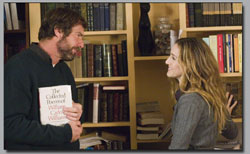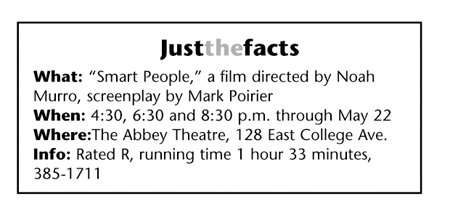| ||||||
A smart film about ‘Smart People’
by Judith Reynolds When the fractured Wetherhold family sits down to Christmas dinner, it’s dark, dismal and depressing. Daughter Vanessa (Ellen Page) brags that she researched her new ham recipe on the Internet. Brother James (Ashton Holmes) doesn’t care and complains that the ham is rubbery. Uncle Chuck (Thomas Haden Church) makes a joke. Lawrence, the father, ineffectually calls a truce. Into this sad bouillabaisse comes Dr. Janet Hartigan (Sarah Jessica Parker) bearing a cake she lifted from a hospital Christmas party. Decorated with green icing, the cake bears the name of a new drug. An odd holiday leftover from a pharmaceutical company? Merry Christmas and welcome to the world of “Smart People,” now playing at the Abbey Theatre through May 22. This is a smart, understated movie about people who think they’re smart. But there’s a fly in the holiday pudding. Director Noah Murro and screenwriter Mark Poirier have fashioned a quiet and carefully observed family drama. A swiftly moving prologue begins at the beginning of fall semester at Carnegie Mellon University. Professor Lawrence Wetherhold (Dennis Quaid) lethargically opens his class on Victorian lit. Notice words like “lassitude” scrawled on the board. They have significance, so does the professor’s casual mention of his curmudgeonly reputation. Wetherhold drearily asks his students to fill out name badges, even though most have taken classes with him before and remind him of the fact. He doesn’t know them, and he doesn’t care. After the prologue, we quickly learn why. Wetherhold’s wife has died, his efforts to publish have been thwarted, and he has become a dead-man walking. To make matters worse, the Wetherhold family has not rallied American style. Unexpected plot twists, solid performances by the ensemble cast and quick-cutting scenes between concurrent events keep this troubled tale moving. Everything drives toward an understated and debatable ending. No movie is perfect.
Ironically, “Smart People” has been billed as comedy/drama/romance. The laughs are few, given over mainly to Uncle Chuck, his quirky behavior and attitudes and even quirkier wardrobe. The romance is questionable, so we’re left with drama. And that’s where this story of human struggle belongs. In addition, the filmmakers have taken a point of view about academia. This is no “Goodbye, Mr. Chips.” “Smart People” unfolds in a culture that encourages contentious one-up-manship and tolerates arrogant, self-absorbed professors. Wetherhold is bitter. He languishes on committees, keeps up the sham of scholarship and, of course, has tenure. In this aerie realm, he has sunk into a torpor. Jealous and disappointed, weighed down by unresolved grief, he doesn’t care anymore. Vanessa (played by Page with the same sharp juvenile vivacity as her performance in “Juno”) is daddy’s girl. She’s a hyper-know-it-all who tries to fill some of her mother’s roles at home. James escapes to a college dorm room. So it’s up to the two interlopers, Chuck and Janet, to change things. Much is made of Chuck being Lawrence’s adopted brother. There’s an important plot reason why, not to be given away here. Loopy and unemployed, Chuck shows up to lean on his employed, therefore successful, brother – again. Conveniently, a bizarre accident forces Lawrence to accept Chuck. The poor relation stays, and the film takes on the whiff of, what else, a Victorian novel? Dr. Hartigan’s entrance also smells strangely like Dickens. Early in the film, Janet attends a hospitalized Lawrence. She recognizes him as a former professor whom she idealized years ago. Of course, he doesn’t recognize her and is obtuse. But time passes and the two go out on a date. Janet’s freshman crush explains why she agrees. The odd romance begins and almost ends when Lawrence holds court over dinner entirely on the subject of himself. Janet bails. Lawrence awakens to the new experience of caring about someone else. He’s further fueled by rereading an old class paper of Janet’s titled “Killing Time in Bleak House.” The Dickens reference will be manna to any student of Victorian literature. It comes in handy in a film about a family thrown asunder by a death, visited by an errant relative and then an interloper from the outside. Alas, there is no endless Jarndyce and Jarndyce case here, but screenwriter Poirier manages to observe his characters closely and pull out a few quasi Victorian lit surprises. The movie spans a year. It begins and ends neatly at the cusp of a fall semester in Professor Wetherhold’s class. Note the differences in his demeanor and behavior. Like that other recent film about an academia, “The Squid and the Whale,” this movie narrows its focus on a family with two children. “Smart People” is also an ensemble piece, and everyone changes – even Uncle Chuck. •
|
In this week's issue...
- December 18, 2025
- Let it snow
Although ski areas across the West have taken a hit, there’s still hope
- December 18, 2025
- Look, but don't take
Lessons in pottery theft – and remorse – from SW Colorado
- December 11, 2025
- Big plans
Whole Foods, 270 apartments could be coming to Durango Mall parcel




